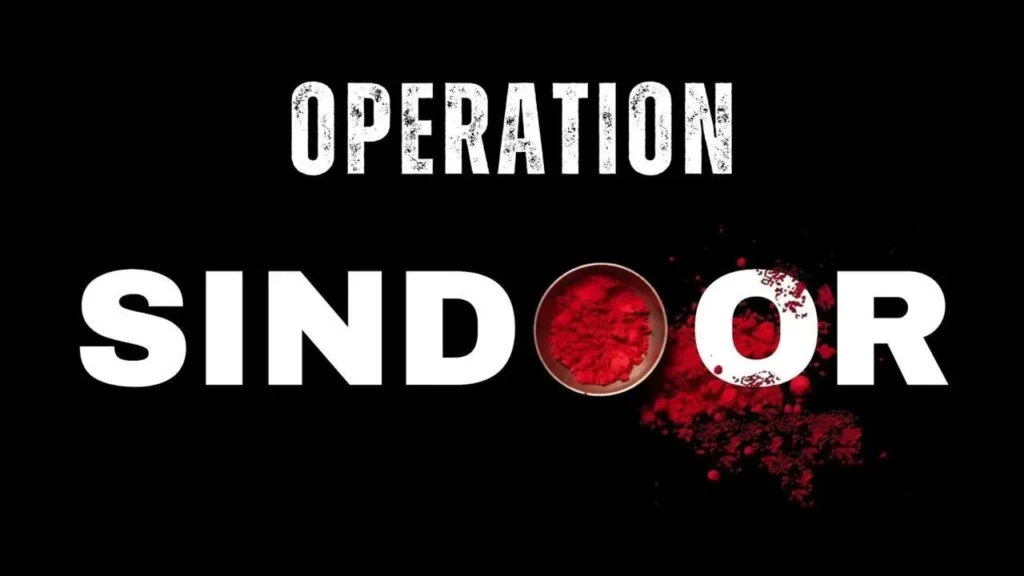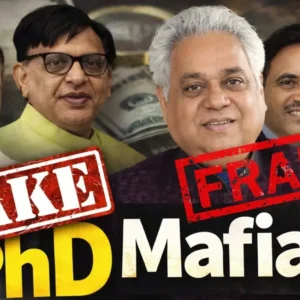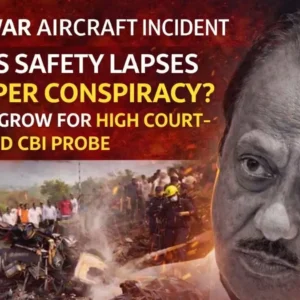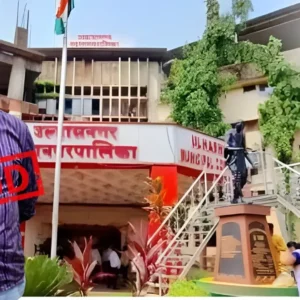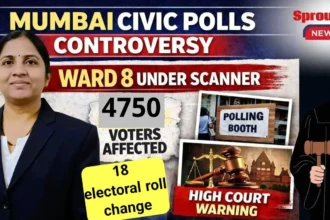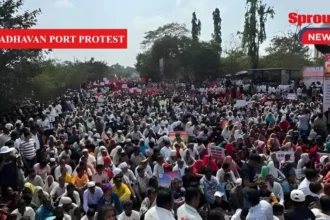Pahalgam Terror Probe Misfires
• NIA U-turn Shocks Nation
• Sketches Fake, Terror Real
Unmesh Gujarathi
Sprouts News Exclusive
Contact: +91 9322755098
- Pahalgam Terror Probe Misfires
- • NIA U-turn Shocks Nation
- • Sketches Fake, Terror Real
- Sketches That Misled the Nation: Pahalgam Probe Under Scrutiny
- Wrong Sketches, Wasted Efforts: 60 Days Chasing Ghosts
- Was It Haste or a Strategic Diversion? Questions Mount
- Also Read: Fake Sexual Shaming Scandal Rocks Motilal Oswal Financial Services (MOFSL).
- Terrorism Investigation in India: Need for Protocol Over Politics
- Accountability Must Follow Error: Sketch Misstep Is a National Setback
The Pahalgam terror probe has taken a shocking turn as the NIA revealed that the three suspects sketched and publicized after the attack were not involved. The real perpetrators were different Pakistani terrorists. This major intelligence lapse raises serious questions about the government’s haste, credibility, and national security procedures.
Sketches That Misled the Nation: Pahalgam Probe Under Scrutiny
The Pahalgam terror attack on April 22, in which 25 tourists and a local Kashmiri youth were brutally killed, shocked the nation. Within 48 hours, the Central Government released sketches of three alleged terrorists, claiming swift identification. These sketches were circulated widely across Indian and global media, hailed on social media as proof of quick action by the Modi government.
However, two months later, the National Investigation Agency (NIA) has revealed that none of the individuals in the released sketches were actually involved in the Pahalgam massacre. This startling admission has raised serious concerns about the accuracy and haste with which the initial investigation was conducted.
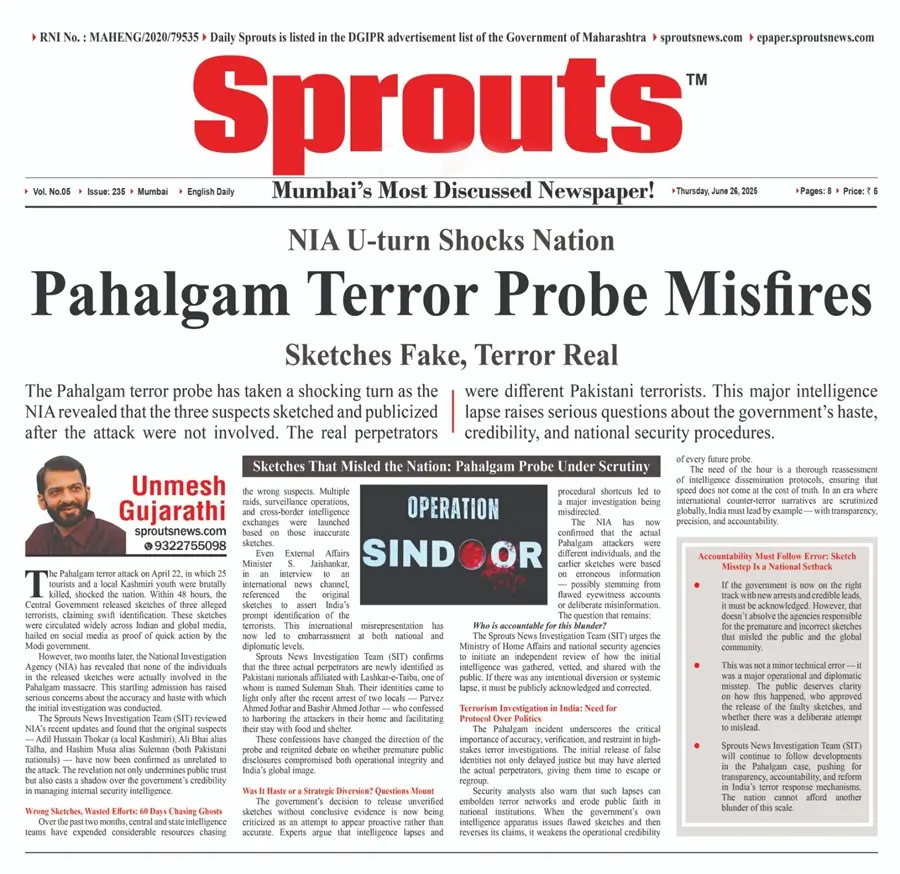
The Sprouts News Investigation Team (SIT) reviewed NIA’s recent updates and found that the original suspects — Adil Hussain Thokar (a local Kashmiri), Ali Bhai alias Talha, and Hashim Musa alias Suleman (both Pakistani nationals) — have now been confirmed as unrelated to the attack. The revelation not only undermines public trust but also casts a shadow over the government’s credibility in managing internal security intelligence.
Wrong Sketches, Wasted Efforts: 60 Days Chasing Ghosts
Over the past two months, central and state intelligence teams have expended considerable resources chasing the wrong suspects. Multiple raids, surveillance operations, and cross-border intelligence exchanges were launched based on those inaccurate sketches.
Even External Affairs Minister S. Jaishankar, in an interview to an international news channel, referenced the original sketches to assert India’s prompt identification of the terrorists. This international misrepresentation has now led to embarrassment at both national and diplomatic levels.
Sprouts News Investigation Team (SIT) confirms that the three actual perpetrators are newly identified as Pakistani nationals affiliated with Lashkar-e-Taiba, one of whom is named Suleman Shah. Their identities came to light only after the recent arrest of two locals — Parvez Ahmed Jothar and Bashir Ahmed Jothar — who confessed to harboring the attackers in their home and facilitating their stay with food and shelter.
These confessions have changed the direction of the probe and reignited debate on whether premature public disclosures compromised both operational integrity and India’s global image.
Was It Haste or a Strategic Diversion? Questions Mount
The government’s decision to release unverified sketches without conclusive evidence is now being criticized as an attempt to appear proactive rather than accurate. Experts argue that intelligence lapses and procedural shortcuts led to a major investigation being misdirected.
The NIA has now confirmed that the actual Pahalgam attackers were different individuals, and the earlier sketches were based on erroneous information — possibly stemming from flawed eyewitness accounts or deliberate misinformation. The question that remains: Who is accountable for this blunder?
The Sprouts News Investigation Team (SIT) urges the Ministry of Home Affairs and national security agencies to initiate an independent review of how the initial intelligence was gathered, vetted, and shared with the public. If there was any intentional diversion or systemic lapse, it must be publicly acknowledged and corrected.
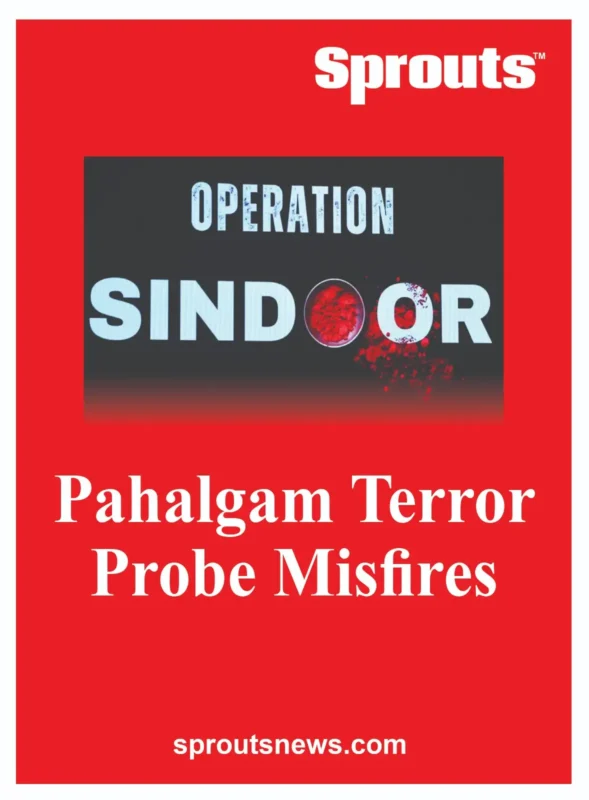
Also Read: Fake Sexual Shaming Scandal Rocks Motilal Oswal Financial Services (MOFSL).
Terrorism Investigation in India: Need for Protocol Over Politics
The Pahalgam incident underscores the critical importance of accuracy, verification, and restraint in high-stakes terror investigations. The initial release of false identities not only delayed justice but may have alerted the actual perpetrators, giving them time to escape or regroup.
Security analysts also warn that such lapses can embolden terror networks and erode public faith in national institutions. When the government’s own intelligence apparatus issues flawed sketches and then reverses its claims, it weakens the operational credibility of every future probe.
The need of the hour is a thorough reassessment of intelligence dissemination protocols, ensuring that speed does not come at the cost of truth. In an era where international counter-terror narratives are scrutinized globally, India must lead by example — with transparency, precision, and accountability.
Accountability Must Follow Error: Sketch Misstep Is a National Setback
If the government is now on the right track with new arrests and credible leads, it must be acknowledged. However, that doesn’t absolve the agencies responsible for the premature and incorrect sketches that misled the public and the global community.
This was not a minor technical error — it was a major operational and diplomatic misstep. The public deserves clarity on how this happened, who approved the release of the faulty sketches, and whether there was a deliberate attempt to mislead.
Sprouts News Investigation Team (SIT) will continue to follow developments in the Pahalgam case, pushing for transparency, accountability, and reform in India’s terror response mechanisms. The nation cannot afford another blunder of this scale.



